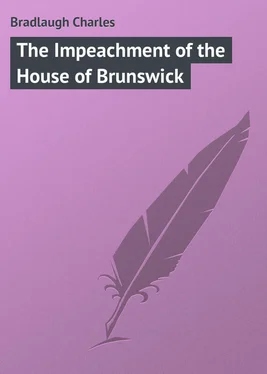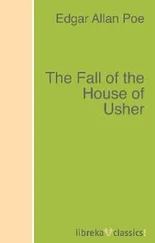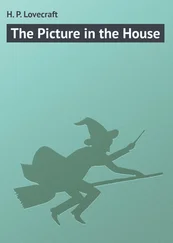Charles Bradlaugh - The Impeachment of the House of Brunswick
Здесь есть возможность читать онлайн «Charles Bradlaugh - The Impeachment of the House of Brunswick» — ознакомительный отрывок электронной книги совершенно бесплатно, а после прочтения отрывка купить полную версию. В некоторых случаях можно слушать аудио, скачать через торрент в формате fb2 и присутствует краткое содержание. Жанр: foreign_prose, на английском языке. Описание произведения, (предисловие) а так же отзывы посетителей доступны на портале библиотеки ЛибКат.
- Название:The Impeachment of the House of Brunswick
- Автор:
- Жанр:
- Год:неизвестен
- ISBN:нет данных
- Рейтинг книги:4 / 5. Голосов: 1
-
Избранное:Добавить в избранное
- Отзывы:
-
Ваша оценка:
- 80
- 1
- 2
- 3
- 4
- 5
The Impeachment of the House of Brunswick: краткое содержание, описание и аннотация
Предлагаем к чтению аннотацию, описание, краткое содержание или предисловие (зависит от того, что написал сам автор книги «The Impeachment of the House of Brunswick»). Если вы не нашли необходимую информацию о книге — напишите в комментариях, мы постараемся отыскать её.
The Impeachment of the House of Brunswick — читать онлайн ознакомительный отрывок
Ниже представлен текст книги, разбитый по страницам. Система сохранения места последней прочитанной страницы, позволяет с удобством читать онлайн бесплатно книгу «The Impeachment of the House of Brunswick», без необходимости каждый раз заново искать на чём Вы остановились. Поставьте закладку, и сможете в любой момент перейти на страницу, на которой закончили чтение.
Интервал:
Закладка:
Bradlaugh Charles
The Impeachment of the House of Brunswick
PREFACE TO FIFTH AND AMERICAN EDITION
The kindly reception given to me personally throughout those portions of the United States it has yet been my good fortune to visit, tempts me to comply with the request of many friends, that I should issue here an edition of my impeachment of the reigning family in England. The matter contained in these pages has been delivered orally throughout Great Britain, and, with one exception, no Digitized by has been offered to it. Abuse has been plentiful, and threats of prosecution not infrequent; but although at least one hundred and fifty thousand persons have listened to the lectures, and four editions of the pamphlet have been exhausted in England, only one attempt was made, in the Gentleman's Magazine , to advance any kind of reply. And even in this case, when a formal written discussion had been commenced, the editor of the Gentleman's Magazine refused to allow any rejoinder to his second paper.
It is sometimes alleged against me that the pamphlet is a too personal criticism; my answer is that in every case the points dealt with have affected our national honor, or augmented our national taxation.
This pamphlet is not a Republican one; it is only an indictment alleging the incapacity and viciousness of the House of Brunswick, and a statement of the legal right of the British people to dethrone the succession on a vacancy arising.
That I am a Republican is perfectly true; that I believe a Republican form of government to be possible, by peaceful means in England, is well-known to those who have heard my lectures; and, in issuing this essay to American readers, I desire to show that there are no reasons of personal loyalty, there is no plea of gratitude for personal service, which ought to be urged on behalf of George I. and his descendants.
English by birth, by hope and in ambition, I seek to win from the descendants of those who broke loose from the Brunswicks nearly a century ago, sympathy for those who work with me now to a like end. If I fail, the fault is in the weakness of my tongue and pen, and not from any defects in the cause I advocate.
The more than fair hearing given to my voice emboldens me to hope a patient investigation of the case my pen presents; and should a verdict be given on this great continent unfavorable to me, I feel confident the jury of my readers will patiently weigh my statements before delivering their judgment.
Charles Bradlaugh.
CHAPTER I. INTRODUCTORY
By statutes of the 12 and 13 Will. HE., and 6 Anne c. 11, Article 2, the British Parliament, limiting the monarchy to members of the Church of England, excluded the Stuarts, and from and after the death of King William and the Princess Anne without heirs, contrived that the Crown of this kingdom should devolve upon the Princess Sophia, Duchess Dowager of Hanover, and the heirs of her body, being Protestants. Heirs failing to Anne, although seventeen times pregnant, and Sophia dying about seven weeks before Anne, her son George succeeded under these Acts as George I. of England and Scotland.
It is said, and perhaps truly, that the German Protestant Guelph was an improvement on the Catholic Stuart, and the Whigs take credit for having effected this change in spite of the Tories. This credit they deserve; but it must not be forgotten that it was scarce half a century before that the entire aristocracy, including the patriotic Whigs, coalesced to restore to the throne the Stuarts, who had been got rid of under Cromwell. If this very aristocracy, of which the Whigs form part, had never assisted in calling back the Stuarts in the person of Charles II., there would have been no need to thank them for again turning that family out.
The object of the present essay is to submit reasons for the repeal of the Acts of Settlement and Union, so far as the succession to the throne is concerned, after the abdication or demise of the present monarch. It is of course assumed, as a point upon which all supporters of the present Royal Family will agree, that the right to deal with the throne is inalienably vested in the English people, to be exercised by them through their representatives in Parliament. The right of the members of the House of Bruns wick to succeed to the throne is a right accruing only from the acts of Settlement and Union, it being clear that, except from this statute, they have no claim to the throne. It is therefore submitted, that should Parliament in its wisdom see fit to enact that after the death or abdication of her present Majesty, the throne shall no longer be filled by a member of the House of Brunswick, such an enactment would be perfectly within the competence of Parliament. It is further submitted that the Parliament has full and uncontrollable authority to make any enactment, and to repeal any enactment heretofore made, even if such new statute, or the repeal of any old statute, should in truth change the constitution of the Empire, or modify the character and powers of either Parliamentary Chamber. The Parliament of the English Commonwealth, which met on April 25th, 1660, gave the Crown to Charles II., and the Parliament of the British Monarchy has the undoubted right to withhold the Crown from Albert Edward, Prince of Wales. The Convention which assembled at Westminster on January 22d, 1688, took away the crown from James II., and passed over his son, the then Prince of Wales, as if he had been non-existent. This Convention was declared to have all the authority of Parliament – ergo. Parliament has admittedly the right to deprive a living King of his Crown, and to treat a Prince of Wales as having no claim to the succession.
In point of fact two of the clauses of the Act of Settlement were repealed in the reign of Queen Anne, and a third clause was repealed early in the reign of George I., showing that this particular statute has never been considered immutable or irrepealable. It is right to add that the clauses repealed were only of consequence to the nation, and that their repeal was no injury to the Crown. The unbounded right of the supreme Legislature to enlarge its own powers was contended for and admitted in 1716, when the duration of Parliament was extended four years, a triennial Parliament declaring itself and all future Parliaments septennial. Furthermore, it has been held to be sedition to deny the complete authority of the Irish Parliament to put an end to its own existence.
It has been admitted to be within the jurisdiction of Parliament to give electoral privileges to citizens theretofore unenfranchised; Parliament claims the unquestioned right to disfranchise persons, hitherto electors, for misconduct in the exercise of electoral rights, and in its pleasure to remove and annul any electoral disability. The right of Parliament to decrease or increase the number of representatives for any borough has never been disputed, and its authority to decrease the number of Peers sitting and voting in the House of Lords was recognized in passing the Irish Church Disestablishment Bill, by which several Bishops were summarily ejected from amongst the Peers. It is now submitted that Parliament possesses no Legislative right but what it derives from the people, and that the people are under no irrevocable contract or obligation to continue any member of the House of Brunswick on the throne. In order to show that this is not a solitary opinion, the following Parlimentary dicta are given: —
The Honorable Temple Luttrell, in a speech made in the House of Commons, on the 7th November, 1775, showed "that of thirty-three sovereigns since William the Conqueror, thirteen only have ascended the throne by divine hereditary right… The will of the people, superseding any hereditary claim to succession, at the commencement of the twelfth century placed Henry I.
Читать дальшеИнтервал:
Закладка:
Похожие книги на «The Impeachment of the House of Brunswick»
Представляем Вашему вниманию похожие книги на «The Impeachment of the House of Brunswick» списком для выбора. Мы отобрали схожую по названию и смыслу литературу в надежде предоставить читателям больше вариантов отыскать новые, интересные, ещё непрочитанные произведения.
Обсуждение, отзывы о книге «The Impeachment of the House of Brunswick» и просто собственные мнения читателей. Оставьте ваши комментарии, напишите, что Вы думаете о произведении, его смысле или главных героях. Укажите что конкретно понравилось, а что нет, и почему Вы так считаете.











